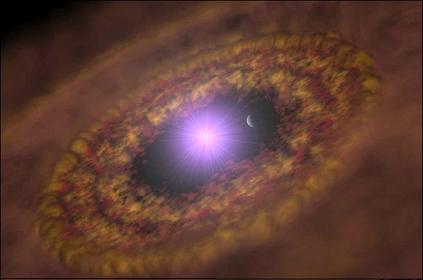Its age is estimated at 8-10 million years, and its sun, which is roughly its age, did not have enough time to evacuate or blow away the entire disk of dust that surrounds it, the planet rotates within the disk and orbits its sun every three and a half days

The theory holds that planets form inside the swirling discs of dust and gas that surround the stars at the beginning of their lives. Therefore, the study of very young stars can help astronomers know more about the birth and development of solar systems - including our own.
Johnny Staiwan of the Max Planck Institute for Astronomy in Heidelberg and his colleagues say the mass of the new planet is 10 times that of Jupiter and it orbits the star TW Hydrae, a young star 8-10 million years old. The planet orbits the star for 3.56 days at a distance of about 6 million km, within the inner boundary of the dust disk of the young system.
The researchers write in the research that the study showed how the process of planet formation can begin quickly, before the star has enough time to clean up the debris from the immediate environment. "This phenomenon illustrates the argument that planets can form within 10 million years, before the disk is scattered everywhere by the solar wind and radiation." they write
The observations were made from the 2.2 meter diameter Max Planck telescope at the European Southern Observatory in La Silla, Chile. TW Hydrae is 182 light years away in the Hydra group, one of the largest constellations in the sky.
Earth number 2 is formed 424 light years away
The oldest planet has been discovered - orbiting a sun that has long since ended its life
